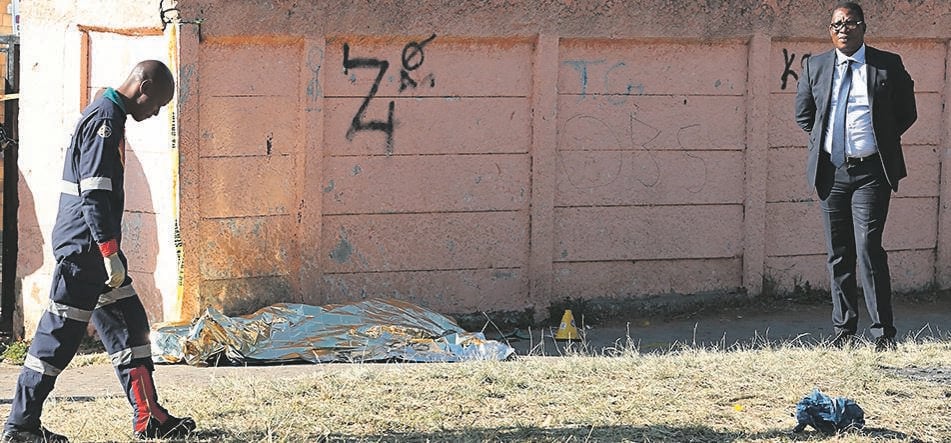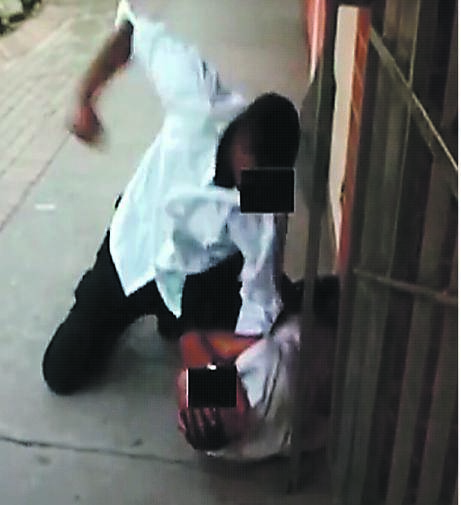
Two summits have been convened so far this year, with stakeholders offering various suggestions on ways to tackle the scourge. Here are some of them:
Send soldiers to schools
This was among the pleas that teachers, parents and experts made to Gauteng education authorities at a school safety summit, convened in April.
But Gauteng education spokesperson Steve Mabona was quick to refute this proposal, saying: “We cannot have a military area in our schools – I mean, it will be tense.”
Last week, those calls were made again after Daniel Bakwela (16), a Grade 10 pupil at Forest High School in Turffontein, was stabbed to death, allegedly by his schoolmate, Grade 11 pupil Mohamed Mwela (19).
Mwela now faces a murder charge and two counts of attempted murder after last Monday’s attack outside the school.
Forest High was closed for two days following the tragedy, amid allegations of gang and sexual violence occurring at the school.
Mwela, short and slightly built, cut a lonely figure in the dock when he appeared in the Johannesburg Magistrate’s Court last Wednesday.
Bakwela’s aunt, Olga Mbwimi, said her nephew was “too intelligent ... he wanted to be a soccer player and a doctor”.
She believes he had a premonition that he would die.
“He told his friends a few days before he was killed that they must carry his coffin at his funeral,” she said.
Back to the school safety summit, mentioned above, which was held just two months ago.
The Gauteng department of education had organised the summit together with the provincial department of community safety in a bid to tackle gangsterism, bullying and violence in schools.
The conference followed a similar one held by the national department in January, which also sought ways to address school violence.
Among the proposals made at the April summit, Mabona said, was one for the department to enhance security.
But this was “pushed” to the department of community safety.
“If we were to focus on increasing the budget that we have now and utilise that for security, we might not be in a position to manage our programmes and fulfil some of our obligations or our vision,” said Mabona.
“We want to change the quality of our education, for it to be more skills oriented. We have introduced many schools of specialisation,” he said, adding that these initiatives would suffer if a chunk of the budget was diverted to school security.
Why are our kids killing each other?
University of Pretoria education expert Professor Kobus Maree explained that we live in a violent society in which a staggering number of people commit murders and brutal crimes, along with acts of bullying.
In South Africa, he added, people tend to test boundaries with impunity.
Maree said the entire world was in upheaval and children were being bombarded with negative news daily about a bleak, jobless future.
“These things cause huge uncertainty and promote a sense of insecurity and frustration. Children see, hear, read about and experience these occurrences.
“So, what do they do? Being natural imitators, they imitate. They also do what they see others doing: express their anger by bullying, hurting, insulting others; by acting lawlessly.”
Maree said adults must keep children’s ages in mind to understand why they act out in this way.
“They are extremely vulnerable and impressionable. They are in search of their own identity, and many things, including the way in which people in society – parents, leaders, managers and friends – behave, shape their identity.
“They are also natural testers of boundaries. When they see people in society express their anger or frustration by acting inappropriately, they often do the same.”
What should we do?
Maree suggested the following preventive measures:
• Education: “It is our job to educate kids about age- and gender-appropriate ways of dealing with their anger, insecurity and frustration.”
• Setting an example: “Adults need to model the appropriate ways of expressing oneself.”
• Showing respect: “Leaders, teachers and adults in general need to rekindle a sense of profound respect for others and for life itself.”
In addition, Maree explained: “It is about time leaders at all levels stop talking about violence and begin to demonstrate what it means to treat others in a respectful manner. They should stop preaching respect and kindness, and instead, live those virtues.
“We experience bullying at all levels of society. Many leaders act like little dictators, saying and doing as they please, no matter the consequences, and getting off scot-free.”
Maree said programmes such as those emphasising emotional and social intelligence were needed, and that adults should talk with pupils, not down to them.
“Respect and draw on the expertise of psychologists in our schools. I am curious to find out why educational psychologists, in particular, are not involved more seriously and noticeably in these matters,” Maree said, adding that every school should have direct access to an educational psychologist.
Another useful programme was life instruction, he added.
“By affording pupils a suitable ‘holding environment’ – offering them a safe environment in which they are given the opportunity to express and hear themselves, and feel understood and ‘held’ – is key to any intervention strategy.
“I believe that virtually all pupils want to act in a respectful manner, loathe violence and hate seeing others suffer. It is relatively simple to find a way to let them listen to and heed their inner voices instead of participating in broader, violence-drenched and violence-promoting discourses.”
This year alone there have been 11 serious violent incidents in schools around the country, in which at least six people have died. They include:
. June 4 2019: Forest High School Grade 10 pupil Daniel Bakwela (16) was stabbed to death in a suspected gang attack. Two other pupils were hospitalised.
. May 30 2019: A Grade 11 pupil at Vuluhlanga High School in Butterworth, Eastern Cape, was stabbed by a fellow pupil, allegedly with a sharpened spoon, for his lunch.
. May 21 2019: A 15-year-old Grade 9 pupil stabbed a 16-year-old pupil to death at the Robert Machaka Secondary School in Ga-Mamabolo, Limpopo. The two allegedly fought while playing. Subsequently the suspect stabbed the Grade 8 pupil to death and fled.
. May 21 2019: A 15-year-old pupil in Mankweng, Limpopo, allegedly stabbed a classmate after a fight at school.
. May 12 2019: A 35-year-old security guard at Woodlands Secondary School in Mitchells Plain was stabbed to death while patrolling the school grounds.
. March 14 2019: A 10-year-old boy escaped with minor injuries after being stabbed at school at Welgevonden near Ventersdorp, North West.
. March 13 2019: A 19-year-old from Mondeor High in Gauteng was fatally stabbed while walking to school.
. March 13 2019: A pupil was stabbed at Tlhabane Technical School near Rustenburg in North West.
. February 26 2019: A 13-year-old allegedly used a pair of scissors to stab his 14-year-old classmate to death at Mateane Primary School in Diretsane, North West.
. February 2 2019: A Grade 12 pupil at Diepdale Secondary School in Diepkloof, Soweto, was stabbed eight times, allegedly by a schoolmate, in a fight.
Professor Sarah Gravett, executive dean of education at the University of Johannesburg, said violence was a societal problem.
“Children grow up with violence and may perceive violence as a way to solve problems. In some communities, violent gangs are part of young people’s daily lives, so it is not surprising that violence is also prevalent in schools.”
At the summit, Gauteng education MEC Panyaza Lesufi had pleaded for everyone to play their part in ensuring school safety.
Mabona agreed, telling the parents, members of school-governing bodies and officials from the departments of community safety and social development: “We need to work together to discipline our children. Whatever happens in a community, one way or the other, it will infiltrate the school.”
TALK TO US
What role can parents, teachers and government play to curb violence in schools?
SMS us on 35697 using the keyword
 |
| ||||||||||||
| |||||||||||||




 Publications
Publications
 Partners
Partners









